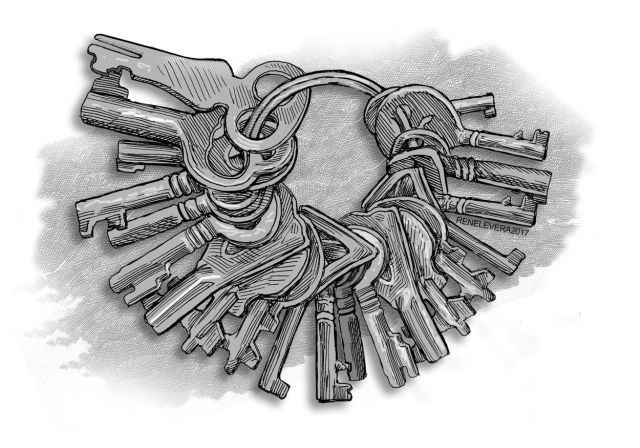
This rainy afternoon I think of keys. One cannot think of a better thing, no matter the weather, because always one faces doors, literal or otherwise. Daily life is somehow a series of entries.
But I mean keys literally. Not only because I need to have a copy of the key to the main door of the house (I have given my own copy to our helper, who needs to clean and so must have access to the house at any time), but also because I have begun collecting all sorts of articles. Hats, for one, which now include several baseball caps, beanies, berets, a bowler and a fedora. And dinner bells, keepsakes from our travels, not to mention refrigerator magnets and key chains. Now the fit of collecting include keys.
Unlike the others, the keys I have gathered came from actual use. Each of them, including those I have failed to match with any lock, has a story, which, thanks to time, might remain unknown, at least for the moment. Still, the story that stays locked could at some point yield to the click of the right key. I need only to remember to wait and not to throw anything away.
The key features in Matthew’s account in his Gospel of Peter’s proclamation of Jesus as the Messiah.
“When Jesus went into the region of Caesarea Philippi he asked his disciples, ‘Who do people say that the Son of Man is?’
They replied, ‘Some say John the Baptist, others Elijah, still others Jeremiah or one of the prophets.’
“He said to them, ‘But who do you say that I am?’ Simon Peter said in reply, ‘You are the Messiah, the Son of the living God.’
“Jesus said to him in reply, ‘Blessed are you, Simon son of Jonah. For flesh and blood has not revealed this to you, but my heavenly Father.
And so I say to you, you are Peter, and upon this rock I will build my church, and the gates of the netherworld shall not prevail against it. I will give you the keys to the kingdom of heaven. Whatever you bind on earth shall be bound in heaven; and whatever you loose on earth shall be loosed in heaven.’”
Jesus entrusted the keys to Simon, whom he renamed Peter, meaning rock, on which rock he would build his church. The keys Simon Peter received were “the keys to the kingdom of heaven.”
Pietro Perugino depicts the incident in a painting in which Jesus gives an actual key, a huge one, to Simon Peter. In fact, Jesus used the term “keys” as a metaphor for the authority to allow entrance. This, Jesus elaborated by saying, “whatever you bind on earth shall be bound in heaven; and whatever you loose on earth shall be loosed in heaven.”
A metaphor is something used to describe another, a different thing, with which it, however, shares some similarities. For instance, Homer referred to “old age” as “stubble,” two unlike things, both of which connote unproductiveness.
Metaphor is itself a key that unlocks the meaning of something else that otherwise would remain concealed. In effect, Simon Peter’s declaration, “You are the Messiah, the Son of the living God,” was a key which opened the true identity of Jesus, and which earned him the Keys, the authority to head his Church, to allow or deny anyone access into the kingdom of heaven.
What then of this afternoon, which of my bunch of keys can I use to unlock it? “The earth has many keys,” wrote Emily Dickinson. To her the land and the sea and the cricket are among the keys to the mysteries of the earth. “Beauty is nature’s fact,” she added.
Of that beauty, indeed, of the Beautiful Himself, Simon Peter must have had an inkling, when he declared, “You are the Messiah, the Son of the Living God.” On this key hangs Simon Peter’s story.